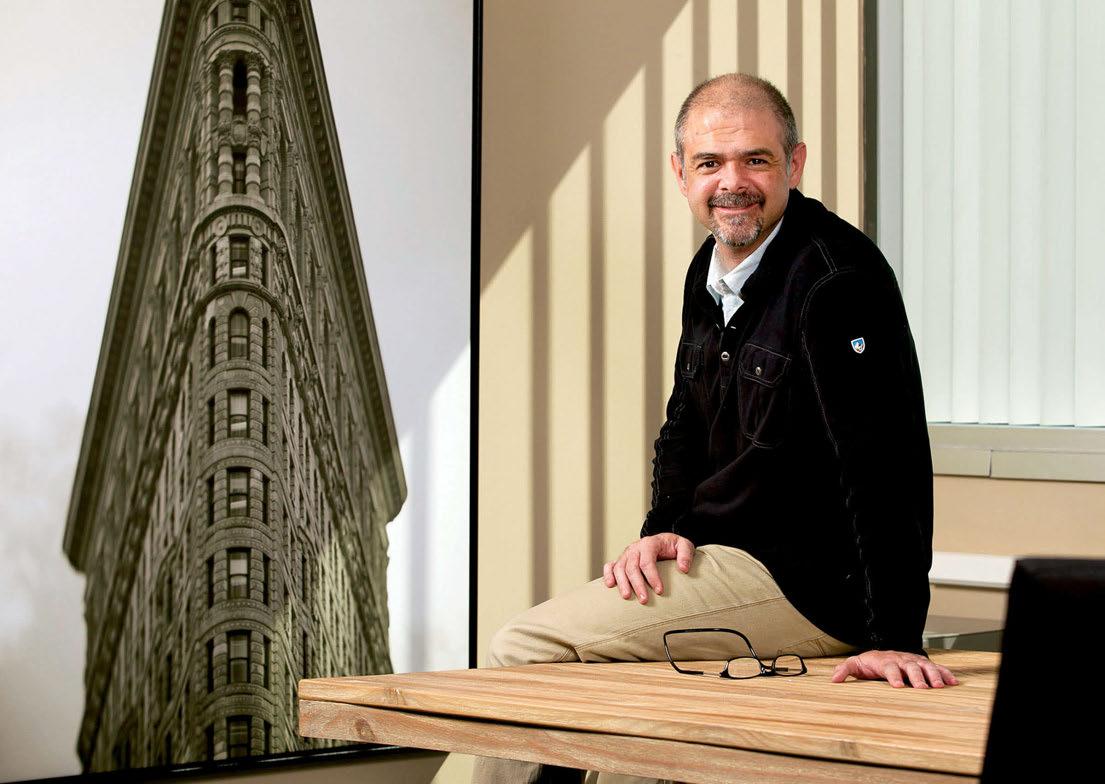
4 minute read
Givers
JOE SCHMIDT Entrepreneurial humanitarian
DLaunched in November 2013, Audacity Factory’s initial focus is human trafficking. The cause has no clear enemy, Schmidt says, but is so horrific that “people run from” it. His organization is headed the other way.
Advertisement
ENDcrowd.com, a crowdsourcing venture incubated by Audacity Factory, has raised nearly $90,000 for charities that serve victims of human trafficking. And now the nonprofit is raising money at screenings of In Plain Sight, a documentary about human trafficking, for six “aftercare” homes throughout the U.S. that serve its victims.
Schmidt says his upbringing in rural Indiana prepared
“Doing the right thing isn’t always safe,” says Joe Schmidt, 43, founder of Audacity Factory, a Raleigh nonprofit that applies business-world techniques to “world-changing” ideas in order to address underserved areas of humanitarian need. him for a career that applies entrepreneurialism to humanitarian causes. He describes his father as a serial entrepreneur; his mother as a world-traveling missionary. Schmidt keeps busy with pursuits on all fronts. He and business partner Tom Lotrecchiano recently self-published a book they co-wrote, Entremanureship. He has also helped grow Newhope Church, a Wesleyan church formed in Chapel Hill in 2002 that he says is now one of the 10 fastest-growing churches in the U.S., with 7,000 members and seven campuses throughout the world. The graduate of Ball State University also holds an
MBA from Boston College. In 1996, right out of grad school, he moved to Raleigh because he was “chasing a girl.” Cheryl Schmidt is now his wife of 17 years.
Schmidt’s career has taken him from Raleigh ad firm Howard/Merrell to his first startup, Eosk, an e-commerce touch-screen business that “failed miserably,” and to bloomingdales.com, which he says he turned into $10 million-a-year business.
He also served as director of sales for Raleigh startup Art.com, an online marketplace for framed art. In 2004, after art.com was acquired by allposters.com, he and Lotrecchiano co-founded Canvas on Demand, a service that turns customers’ photos into canvas artwork. They sold the company in 2010 to cafepress. com. Schmidt served as chief marketing officer until 2013.
Today Schmidt and his wife, a former teacher in the Wake County Public School System, live in north Raleigh near Falls Lake with their three daughters, now 11, 8, and 6.
“Our girls are very special to us, but they’re not any more special than any other little girl anywhere,” Schmidt says. “The idea that freedom is taken away from little girls just like mine in horrific ways is just unacceptable.”
by Todd Cohen
Carolyn Cole
Why are you targeting human trafficking?
The average age for a kid here in the U.S. to get (victimized by) sex trafficking is 12 to 14 years old. It’s mainly girls, but boys as well. A clear enemy is just not present.
It’s bad guys. They look very, very different all over the world. Human trafficking is the second-largest illegal industry in the world – $150 billion worldwide. The abolition movement is probably expending $100 million annually worldwide. We’re fighting criminals who are smart business people who have guns, and we’re showing up with a pair of fingernail clippers to a gunfight.
What’s the solution?
Change the hearts of men. The problem of human trafficking is born out of the desires and the needs of the hearts of men, both sexual exploitation of women as well as labor exploitation. Both come directly from the hearts of men who are making poor choices. I look at human trafficking as I would any other business model. Until we focus on demand, we’ll never make significant headway to solving the problem.
Is that the message of In Plain Sight?
We’re all involved in human trafficking – the clothes we buy, the food we eat, the pornography we choose to watch. Everything we do, somewhere in the production line of these things, human trafficking exists. We have to break people’s hearts for this and get people to understand this is happening everywhere all around us. And we don’t even know we’re part of it.
What did you learn from your parents?
My father, Ken Schmidt, taught me that every problem is truly an opportunity in disguise, and that success is 99 percent perspiration and one percent inspiration. He pounded it into me as he made me sweep floors over and over again. My mother, Jackie Schmidt, taught me that being a Christian was very simple in that you’re supposed to love God and serve other people.
What is your earliest memory of philanthropy?
We lived in a racially charged country town in Indiana, where the Ku Klux Klan was still big. There was a single mom and her kids

One of the projects ENDCrowd has supported is a three-month study of young boys in Thailand to assess the needs of exploitated and trafficked boys. It’s a group that is often overlooked. •milly•missoni trixie•toryburch
& heritage•chanel•louisvuitton•louboutin•trinaturk•alice robertrodriquez•dianevonfurstenburg•hautehippie•halston
DESIGNERRESALE BOUTIQUEOVERSTOCK NEWFASHION ACCESSORIES
Callforyourspring/summer consignmentappointment— Dresswillcometoyouforpickup!
NowintroducingBellizaKnightJewelry ExclusivelyinRaleigh







